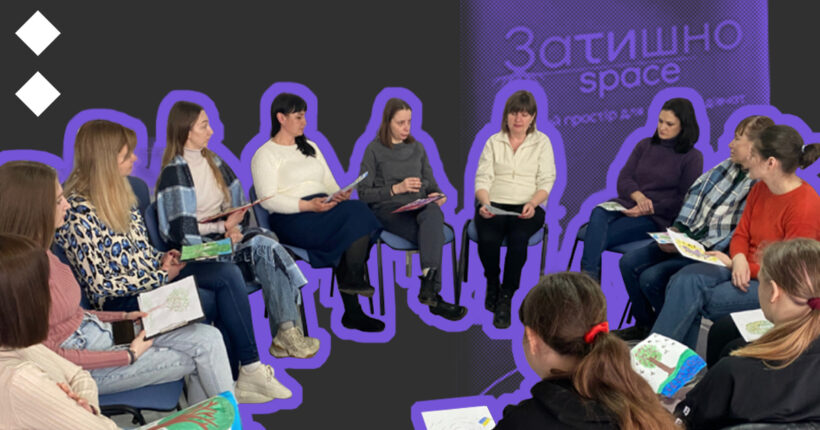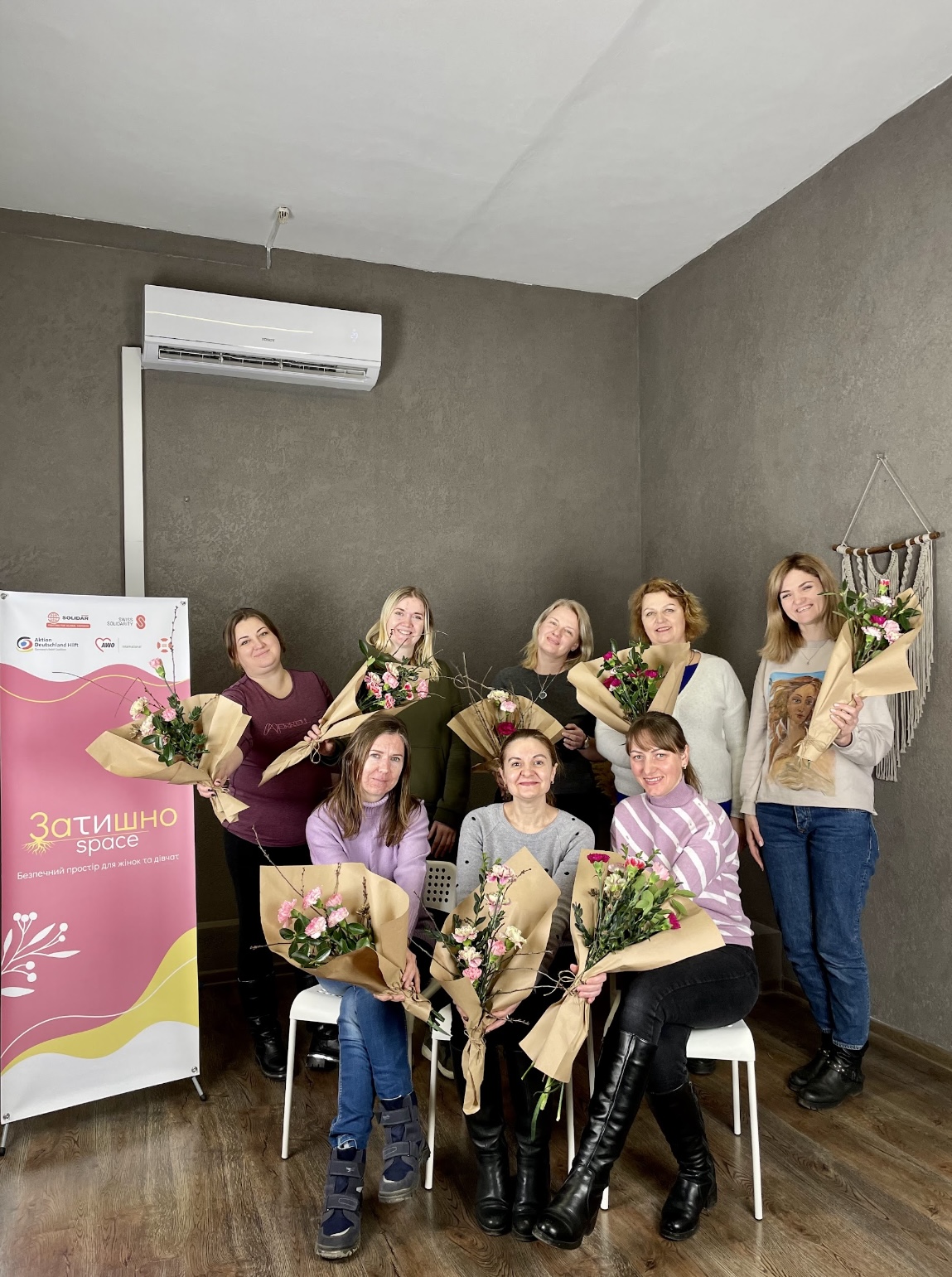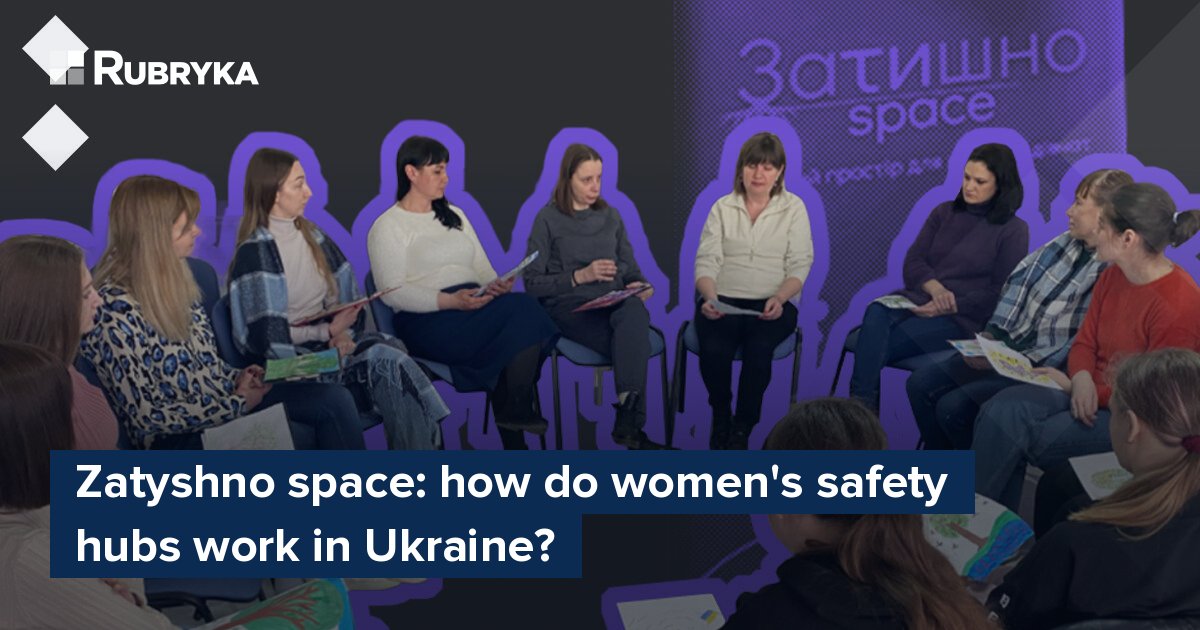
What is the problem?
Russia's full-scale war forced the majority of women to leave their homes, stay alone or with children, and have no societal support.
In March 2022, Ukraine's Vostok SOS Charitable Foundation hotline received hundreds of calls requesting evacuation from the frontline towns, as people needed psychosocial and legal support. Since the beginning of the full-scale war, the foundation team has evacuated 45,000 Ukrainians, 4,500 of whom are disabled people. Today, internally displaced women still require various types of assistance.
What is the solution?
With the support of international donors, the team of Vostok SOS foundation has established a network of daycare centers called "Zatyshno (Cozy) Space" in the central and southern cities of Cherkasy, Kropyvnytskyi, Vinnytsia, Mykolaiv, Zaporizhzhia, and Khust in Zakarpattia.
Each center provides the help of psychologists, social workers, and lawyers, who educate visitors on gender-based violence, raise awareness and make sure every person is heard and seen.

Visitors of the entrepreneur course in Cherkasy
"We create training courses and care for women's physical and emotional health. Many visitors come to our hubs with their children, so teachers take care of them during events and do art therapy activities," says Oksana Kuyantseva, board member of the Vostok SOS foundation, director of the "Zatyshno space" project, and manager of humanitarian programs.

Oksana Kuyantseva, board member of the Vostok SOS foundation, director of the "Zatyshno space" project, and manager of humanitarian programs.
Women can find new friends, get proper help in resolving legal issues, such as document restoration, divorce, establishing the fact of death or birth in the occupied territory, learn about social services, and attend an individual consultation or a group support session with a therapist.
What do these safety hubs provide?
The project provides women aged from 16 with every kind of activity, such as:
- personal consultations from qualified psychologists, lawyers, social workers, and specialists on gender-based violence;
- training, lectures, workshops, watching movies with experts, etc., announcements of events can be found in the Telegram channels of the hubs);
- improve their qualifications or learn new skills in courses;
- the coworking area for work and study;
- meeting people;
- hosting own events.
Each center has a large playroom with two teachers to spend time with the children. Women, their kids, and teenagers attend joint developmental and creative activities every week.

Children's workshop in Kropyvnytskyi
"Zatyshno space" has a box where women can speak up their minds anonymously if they struggle to talk through their issues with a psychologist, lawyer, or social worker. If the visitors have other requests, the specialists provide them with contacts of proper experts in the relevant fields.
The box can be found here. Answers are published on the project's channels using the hashtag #convenientquestions.
How to start a safety hub?
To launch such a project, one must connect the efforts of various specialists, such as psychologists, social workers, lawyers, and teachers.
How is the team formed?
"We manage to find specialists whose personal and professional qualities are on top. The main difficulty is explaining the idea of safety hubs, concept of working with visitors, and creating a safe space. It is important to find people with a sincere desire to help and a high level of empathy," says Oksana Kuyantseva.
The team welcomes displaced women, understand their needs, and gets into what they have been through. Specialists with preschool children are also welcome here, as a teacher works with the kids in the hub.
The project specialists regularly educate themselves and pay a lot of attention to the emotional and physical condition of the team, as they meet disoriented and tired women every day. It is the experts who make efforts to restore their sense of calm and thirst for life.
How to choose the right space?

Children's playroom in Cherkasy
All premises for the "Zatyshno space" are rented. To meet the needs of the hub, one must find two large halls for adults and children, as well as two or three separate counseling rooms.
"We pay special attention to availability and safety, so all the spaces are located on the ground or basement floors, have ramps or no steps, and are in the city centers near bus stops. We always pay attention to whether there are any dangerous facilities nearby and whether there is an equipped shelter." Oksana Kuyantseva adds.

Floral masterclass in Khust
How is the contact network formed?
When the team is formed, it starts the big research. The main task is to group all women, which means a lot of live communication, finding common interests, and understanding cooperation. The project has many partnerships with organizations focused on women's rights protection.
Cooperation with to-be employers is also an indispensable aspect, as all the training for visitors is free. Representatives of the police, employment centers, and social services are always woven into in the events.
"The hardest part for us is traveling around the cities, looking for specialists, coordinating their work, and responding quickly to visitors' requests, as we open centers in different parts of Ukraine," stresses the director of the "Zatyshno space" project.

Psychological training in Cherkasy
Does it really work?
The "Zatyshno space" project opened its doors in February 2023 in the western town of Khust. Refugees from Kharkiv, Zaporizhzhia, Kyiv, and local residents find comfort there.

Lecture on legal assistance in the central town of Kropyvnytskyi
This safety hub opened in central Cherkasy at the end of 2022. Almost 90% of its visitors are members of war-affected communities. Most of them have become regular visitors.
The most attended type of open talk is dedicated to psychological support in Khust and Cherkasy centers.
At the "Zatyshno space" in Kropyvnytskyi, there is a high request for personal consultations with a lawyer and weekly group sessions with psychologists. Many women are restoring their documents and working with paperwork or referrals to competent services.
Visitors are particularly interested in career guidance and training. For example, in Kropyvnytskyi, about 80 participants joined beauty courses. Some of them received certificates and are already working in their new field, notes Oksana Kuyantseva.
Art and physical activities are also popular in all safety hubs.
So, how useful is it?

Art therapy "Magic Tree" in the central town of Kropyvnytskyi
Art therapy classes release the tension, while language courses nurture confidence as visitors learn Ukrainian and English. Yoga and Pilates classes help to take care of the body.
Educational talks on gender-based violence let women understand their victim state and then take the first step to break the cycle of suffering and abuse.
With these training courses, women can change their jobs if they lose their previous ones or do not understand what to choose.
"Each safety hub has become a place where women share their stories, support each other, experience the pain of loss, and learn to path a future. They find homes in new cities, seek support, and reveal their talents and hobbies. Most importantly, they have a space where therapists support them through depressive episodes," says Oksana Kuyantseva.
Volunteers have also launched women's support groups that are waiting tirelessly for their relatives from the battlefield. Soon, they can turn out into a large project.





